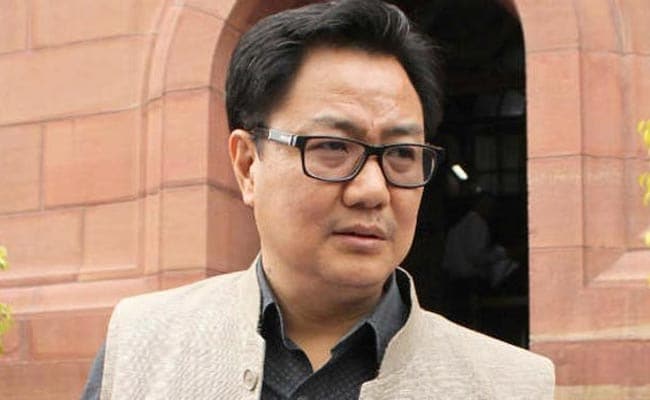
Controversial AFSPA will be withdrawn in Nagaland once situation improves, Kiren Rijiju said. (File)
New Delhi:
The ongoing Naga peace talks were being followed up with utmost sincerity and the outcome of the dialogue would be positive, Union minister Kiren Rijiju said today, but refused to give any time-frame for the signing of the final peace accord.
Mr Rijiju, the minister of state for home affairs, also said the controversial Armed Forces (Special Powers) Act would be withdrawn from Nagaland, Arunachal Pradesh and other areas where it is in force once the security situation improves there.
Referring to the ongoing dialogue between the Issak-Muivah faction of the National Socialist Council of Nagaland (NSCN-IM) and the government interlocutor, the minister said the Narendra Modi government was the most sensitive toward the issues of the Nagas and the Northeast.
"The process of Naga talks are being followed up with utmost sincerity. So the outcome will be positive," he told PTI in New Delhi.
Mr Rijiju refused to say anything when asked about the possible dates for signing the final peace accord to bring lasting peace in insurgency-hit Nagaland.
A framework agreement was signed on August 3, 2015 by NSCN-IM general secretary Thuingaleng Muivah and the government's interlocutor R N Ravi in the presence of Prime Minister Narendra Modi.
The framework agreement had come after over 80 rounds of negotiations spanning 18 years, with the first breakthrough made in 1997 when the ceasefire agreement was sealed after decades of insurgency in Nagaland which started soon after India's independence in 1947.
The minister said AFSPA, which empowers security forces to conduct operations, arrest anyone anywhere without prior notice, could be removed from all the places where it is in force when the security situation improves there.
"Since the security scenario in the Northeast has improved in the last four years, AFSPA has been removed from many areas. We are hopeful that with further improvement, it may be lifted from the remaining few areas in the near future," he said.
AFSPA has been completely removed from Meghalaya and partly from Arunachal Pradesh but it is in force in Nagaland, Assam and three districts in Arunachal Pradesh. The controversial law is also in force in Jammu and Kashmir.
Mr Rijiju, the minister of state for home affairs, also said the controversial Armed Forces (Special Powers) Act would be withdrawn from Nagaland, Arunachal Pradesh and other areas where it is in force once the security situation improves there.
Referring to the ongoing dialogue between the Issak-Muivah faction of the National Socialist Council of Nagaland (NSCN-IM) and the government interlocutor, the minister said the Narendra Modi government was the most sensitive toward the issues of the Nagas and the Northeast.
"The process of Naga talks are being followed up with utmost sincerity. So the outcome will be positive," he told PTI in New Delhi.
Mr Rijiju refused to say anything when asked about the possible dates for signing the final peace accord to bring lasting peace in insurgency-hit Nagaland.
A framework agreement was signed on August 3, 2015 by NSCN-IM general secretary Thuingaleng Muivah and the government's interlocutor R N Ravi in the presence of Prime Minister Narendra Modi.
The framework agreement had come after over 80 rounds of negotiations spanning 18 years, with the first breakthrough made in 1997 when the ceasefire agreement was sealed after decades of insurgency in Nagaland which started soon after India's independence in 1947.
The minister said AFSPA, which empowers security forces to conduct operations, arrest anyone anywhere without prior notice, could be removed from all the places where it is in force when the security situation improves there.
"Since the security scenario in the Northeast has improved in the last four years, AFSPA has been removed from many areas. We are hopeful that with further improvement, it may be lifted from the remaining few areas in the near future," he said.
AFSPA has been completely removed from Meghalaya and partly from Arunachal Pradesh but it is in force in Nagaland, Assam and three districts in Arunachal Pradesh. The controversial law is also in force in Jammu and Kashmir.
Track Latest News Live on NDTV.com and get news updates from India and around the world

